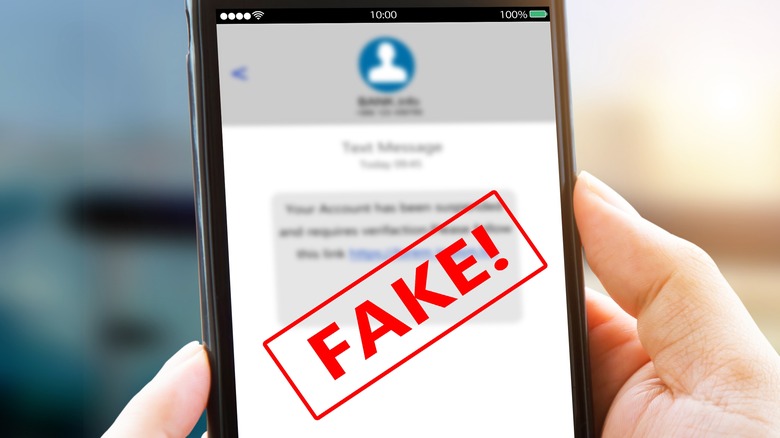Signs Of Online Job Scams You Need To Watch Out For
If you find the idea of working from home to be appealing, you are certainly not alone. Fortunately, there are more opportunities to work remotely now than ever before, and even more are expected to become available in the future. Even so, not everything you see touted as an online work-from-home job actually is. When you're looking for remote work, it's important to know how to separate legitimate opportunities from scams that could lead to identity theft or end up costing you money in other ways.
Not sure how to separate WFH scams from real online work opportunities? Protecting yourself starts with knowing how to recognize the sure signs of an online job scam. Be vigilant in watching out for the indicators listed below and you'll be taking an important step to protect yourself. Being able to recognize online job scams for what they are can help keep you from falling victim to internet predators looking to take advantage of people who are simply looking for a way to earn an honest living working from home.
Getting offered a job without actually applying
Wouldn't it be awesome if a company you never even applied to reached out and offered you a job that you could work remotely from home? The idea of this might sound appealing, but the reality is that scammers actually do this. Companies generally don't hire people who haven't applied or interviewed, and they certainly don't send out cold-call job offers via email or DM. If you get any kind of message claiming to offer you a job that you never even applied for, that's a sure sign that you've been targeted by a scammer.
That's not to say that companies don't sometimes reach out to people who haven't applied via social media, but they don't immediately offer jobs in this way. A legitimate recruiter might contact you through LinkedIn, phone, text, or email to find out if you're interested in applying to work with their company, but they won't immediately offer you a job or guarantee one to you if you follow their instructions. Instead, they'll invite you to fill out an application or submit a resume if you'd like to be considered.
Error-riddled job announcements
If you see a job posting or get an email or DM that seems to be about a work-from-home opportunity but is riddled with language usage errors, typos, and/or grammatical mistakes, chances are that it's a scam. Sure, anyone can make a mistake when writing a message, but we're not talking about ordinary things that tend to get overlooked during proofreading. We're talking about wording that a legit recruiter wouldn't use or errors that would never get approved to be sent out on behalf of a company.
When a message has language like, "Please to apply we are seeking experts like you for company work immediate, you apply now click here and we pay you $5,000 U.S.," there is no question that the message is from a scammer. Don't let a few appealing key terms that appear in a garbled, spammy message like this cause you to fall for phishing, which is exactly what this is.
Promise of easy money
Wish someone would pay you a lot of money to do little to no work? Online job scammers are counting on it. That's how they trick people with fake job postings or offers of fraudulent work using messaging that promises easy money for minimal effort. Don't let a bad actor's promises of easy money cause you to fall for a scam. Sure, some jobs pay better than others — but they require specific skills, hard work, and results that drive the company's bottom line. No legitimate employer is out there trying to give away money to people for doing nothing.
Get-rich-quick schemes are called schemes for a reason. If you see a work-from-home job advertised that seems to be promising a chunk of money for little to no effort, that's not an employer looking for an employee. Best case scenario, it's a pyramid scheme. More likely, it's a scammer looking for their next victim.
Vague job description
When you read a job description or recruitment posting for a job, you should have a pretty clear idea of what the job entails. Scammers, however, like to write vague job postings that don't say a whole lot other than some version of "make money online" or "make money at home," so that they can scam a wider audience than if their announcement were more specific.
Legitimate employers aren't out there looking to dole out easy work-from-home opportunities, so that's not what they're going to emphasize in their job announcements. They're going to focus on the job itself and the skills required to do the job; where the work will be performed is secondary to the actual job. If a job can be done remotely, that'll be mentioned in the job posting, but it won't be the headline.
Keep this in mind: If a job posting doesn't convey what the job involves and what qualifications are required, then it wasn't written with the goal of actually hiring someone.
Advertised pay well above the going rate
Online job scammers like to tempt people by promising extremely high pay for work that generally pays significantly less. The idea is that a person might ignore warning signs of a scam if the potential reward for taking a bit of a risk is high enough. For example, if you see a job posting or get a message promising $50 per hour for work-from-home clerical tasks that ordinarily pay less than half that amount, you can be certain that the so-called WFH opportunity is a scam.
If you come across this kind of posting, remind yourself that if a legit employer is paying a whole lot more than the going rate for a certain type of job, they aren't going to have to scour the internet looking for applicants. Instead, they'll probably already have more applicants than they could possibly interview, let alone hire.
The recruiter is pressuring you to act fast
Hiring qualified employees for real jobs takes time. When hiring, a company wants to bring on people who have the necessary skills and who actually want the job. After all, no for-real employer wants to hire you for an online job only to have to replace you right away because the position isn't a good fit or you're not well-suited for telecommuting. A reputable recruiter won't pressure a candidate to make a snap decision. If you find yourself in a situation where someone is using high-pressure tactics to push you to make an immediate decision about what they're claiming is a job offer, it's more likely that they're trying to scam you than hire you.
Online job scammers know that the longer you think about what they claim to be offering, the more likely you are to figure out that they're trying to steal your identity or involve you in fraudulent activities. They don't want you to realize that they're trying to pull the proverbial wool over your eyes, so they'll push you to hurry up and act now before the offer is gone forever.
Help wanted comments in social media groups
There are a lot of places where employers can advertise jobs, from job search sites like Indeed and Zip Recruiter to employment posting features on social media sites like LinkedIn or Facebook. Sites that accept job postings have requirements and guidelines for what gets posted, so scam posts touting fake jobs aren't likely to be accepted or, if they do make it up, will probably get taken down very quickly or flagged by users as fraudulent.
Since scammers can't depend solely on traditional job posting options to consistently target victims, they look for other ways to get their messages on websites that appeal to people looking for WFH opportunities. Scammers often target Facebook groups and other social media groups or forums with posts or comments that contain their less-their-legit schemes. If you're in a social media group focused on a hobby or special interest and someone is posting off-topic job posts, they are most likely a scammer. If you're in a gardening group and someone comments that their company is seeking at-home workers for online job opportunities, keep on scrolling.
Squirrelly job duties
If you see a job posting offering a so-called opportunity to work from home doing something that you didn't think anyone would even hire someone to do, trust your instincts. If it seems like a job that doesn't really exist, then it's probably not really a job at all. Scammers often advertise opportunities to earn money doing things that no legitimate business would hire people to do, either to get your personal information or to trick you into participating in fraudulent activities.
For example, if you see a job posted that involves having packages sent to your home for you to repackage and ship to someone else, chances are that the position is both a scam and illegal. In such a situation, whatever work that a person does is, at best, a scam that you'll never get paid for. At worst (and not unlikely), it may be part of a larger criminal enterprise that could even cause you to get in trouble with the law. Ditto for so-called online jobs that require you to receive checks to deposit, then send part of the money to someone else.
You need to pay to apply
Being asked to pay a job application fee is always a sign of a scam. If you see a so-called job posting or receive a message that seems to promise online employment after you pay an application fee, don't fall for it. It's a racket. If you pay to apply, you'll be swindled out of whatever money you authorize to be charged, and probably a whole lot more. The scammer behind the fake job may make multiple charges to your account beyond the one you authorized, or they may steal your payment information — along with any personal information you enter — to sell on the black market or use for other nefarious purposes.
Employers don't ask people for money to apply or be considered for a job. Period. This simply is not done. A legitimate employer will never charge an application fee or ask a candidate for any kind of payment as part of the application or interview process.
Asking for money to purchase equipment
It's not unusual for remote workers to have to provide their own computers and other home office equipment, but not to have to buy remote equipment from the so-called employer, or to send money to the company so it can purchase equipment on behalf of the employee. No legitimate employer would expect — or even ask — an employee to send in money to buy equipment needed to start a job. Employers pay employees to work for them, not the other way around.
If a would-be employer asks you to send money to buy equipment, trust that this is a scam. If you're talking to someone who claims to have a work-from-home job opportunity to offer, but says that you first have to send in money for equipment, don't fall for the shakedown. Even if they promise you that the company will reimburse you in your first paycheck, don't do it. Not only will you never get a paycheck from them, but you also won't get any equipment or ever see your money again.
Requesting TMI way too early
If you're looking into an online job only to find that they want you to submit very personal information early in the application process, that's a sure sign of a scam. Employment applications do require a lot of information but only details relevant to the job application process. An employer doesn't need to know your social media profiles, your mother's maiden name, or your father's middle name. They also don't need to know the name of your first pet or any other personal information that people commonly work into their passwords.
There are also limits to job-related information that employers can ask for before actually hiring someone. For example, a U.S. employer can ask if you're legally authorized to work in the U.S. during the application process, but they can't request a passport or other right-to-work documentation prior to the time you've accepted a job offer. You also shouldn't be asked to provide in-depth information beyond your job qualifications and work history when applying for a job, especially financial information. No employer needs banking information until you have accepted a job offer, and they're setting you up for payroll, and they never need to know anything about your credit cards.
Can't confirm the company's existence
Anyone can claim to have an online job to offer, whether they do or not. If you see a job posting that looks good but you're not familiar with the company, check to see if you can verify that the organization exists online. The fact that you can find a website doesn't mean that the company exists. It could be a fake URL. Look up their phone number via another source and verify if it matches what's on the website. Look for their contact details; if you can't find out what state they're incorporated in, chances are they're not a real business at all.
It's also important to watch out for so-called companies with familiar-sounding names, but that are just scammers trying to lure you in because you think they are — or are affiliated with — an actual company. For example, scammers will often try to purchase domain names that are similar to reputable businesses and then put up fake sites designed to fool people into thinking they're the real thing. For example, if you see a job posted that looks like it's for a company where you'd like to work, but the URL has "the" in front of the name or "co" added to the end, before the extension, that's a red flag. Do a separate Google search to find the actual company and you'll likely find that its official web presence isn't connected to what's likely a fake job posting at all.
Weird email addresses
Real recruiters tend to have email addresses that represent the actual company or staffing agency that they work for. If someone contacts you via a personal address or one that doesn't match the actual website of the organization that they're claiming to represent, then they're most likely up to no good. Employers are concerned about their brand, so they wouldn't hire someone to reach out to potential applicants via a Gmail or Yahoo account. And, just like a scammer can purchase a domain to use for a scam website, they can also create email addresses using that same domain. Use the tips specified above to see if an email address is based on a real company's domain or not.
If you receive a job solicitation or offer from a suspicious-looking email address, don't click any links in the message and don't reply. If you have a gut feeling that the email is from a scammer, don't reply to verify. Trust your gut and move on. No good ever comes from engaging with a scammer. The more you engage with them, the more opportunity they have to glean even more information about you than they already have.
Social-only contact information
If there is no way to get in touch with a recruiter or company representative other than via social media, that's a sure sign that you're dealing with a scammer. Sure, real companies use social media in their recruitment efforts, but a social profile won't be their only means of contact. If a recruiter reaches out to you via Facebook messenger or DMs on another social media site, don't engage in that way beyond a basic acknowledgment. Instead, ask for their email address or phone number so you can contact them directly. Note: Don't immediately give them your digits. Ask for theirs and check them out before sharing anything about yourself.
Before you email or call, look up the company they claim to represent and see if the domain or number they shared belongs to that business. If someone who reaches out via social media claiming to be hiring isn't able to produce a legit email address or a phone number that you can verify, you can bet that they're not who they claim to be.














